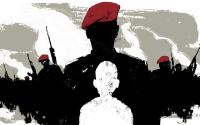15 November 2007The Guardian
The return of Benazir Bhutto from the political dead has been wondrous to behold. Ten years ago, her name was mud around the world: she had been sacked as prime minister; her brother had been gunned down by her own police force; her husband was in prison on corruption charges; and her Swiss bank accounts had been frozen at the request of the Pakistani government. When the heroine of the struggle against the dictatorship of Zia ul-Haq visited Britain, government ministers failed to return her calls.
A decade on, she is the darling of the western media once more, leading the opposition to another US-backed military ruler and somehow, at the same time, the last hope of the US and British governments of keeping a grip on the upheaval now engulfing Pakistan. As she was told by a senior US official at her lowest point in the late 1990s: "We can whitewash you in 24 hours if we need to."
But events are not playing out quite as the Washington choreographers intended. The sweetheart deal they stitched together between the former Pakistani prime minister and the shopworn dictator was intended to produce a power-sharing arrangement which would keep the army on side but offer some modicum of legitimacy to General Musharraf's discredited rule. For Bhutto, it offered a route back to power and the dropping of corruption cases against her. Many in her Pakistan People's party naturally balked at this backchannel accommodation with the enemy. But in private meetings with her closest supporters, she recalled that her more radical father had been hanged "in the night, like Saddam Hussein" for his defiance of the US and that this was the way to get back and do something for the country. Her presence in Pakistan, she assured them, would create a new dynamic.
Which it certainly has, if perhaps not quite as her western sponsors intended. Musharraf's declaration of martial law barely two weeks after Bhutto's tumultuous and blood-drenched return to Karachi was a last throw of the dice to stop the newly assertive supreme court striking down his rigged re-election - whatever the general's claims about its importance for fighting terrorism in the Waziristan badlands. But the impact of the violent crackdown, the arrest of thousands of political activists, the closure of independent TV stations and the street confrontations with striking lawyers have transformed the political situation and united the opposition to the dictatorship.
Bhutto's response this week has been to mobilise her party machine behind the protest movement, abandon all talk of negotiation, insist she would now not serve as prime minister under the general, and call for Musharraf to go. By doing so, she has staunched her loss of support over the perception that she was propping up the dictator, and put herself once again at the head of a popular democratic movement. Despite having insisted earlier this year that she would do no such thing, she has even appealed to the leader of the country's Islamist coalition, Qazi Hussain Ahmed, to join a common front against the dictatorship. Not surprisingly, there is still scepticism about whether Bhutto's break with Musharraf is final and the protests, dominated so far by the middle class and party activists, have yet to draw in wider mass support.
But this is certainly not what the US had in mind for so pivotal a state in its "war on terror". The Bush administration's calls on Musharraf to abandon his dictatorial ways and press ahead with free elections clearly lack all credibility. Not only has the US been Musharraf's principal backer throughout, channelling nearly $11bn-worth of aid to his regime since 2001, but it is also widely accepted that any genuine withdrawal of US support would finish the general off in short order. No wonder Bush has sent his former ambassador in Iraq, John Negroponte, to try to knock his clients' heads together.
For the US, Pakistan has been a woeful foreign policy failure: Musharraf has himself now conceded that nuclear-armed Pakistan is becoming a failed state; and far from being a bulwark against jihadist terror, Pakistan is one of the two countries most closely associated with the rise and entrenchment of al-Qaida - the second being that other dependable American ally, Saudi Arabia.
For Pakistan, the US relationship has been a deepening disaster: the country's exploitation as a strategic asset against the Soviet Union and India in the past, and now as part of the US attempt to control Afghanistan and the wider Middle East, has been a central factor in its stifling by a bloated and anti-democratic military. It can be no surprise that hostility to the US role in the country is so overwhelming, though that is in no way articulated by its unloved political elites.
If ever there were a country begging for a radical social transformation, Pakistan is surely it. This is a state whose potential has been ruthlessly stunted by feudal land ownership and parasitic moneymen, where a third of its 160 million people go hungry and 44% are living below the poverty line, where half the population is illiterate and barely one in two girls goes to school. Such conditions demand a sweeping programme of land reform and public investment in social welfare, health and education. Instead, Pakistan gets corrupt, knockdown privatisations, and most western aid goes straight to the army. Bhutto has at least been arguing the case for large-scale public welfare programmes paid for through deficit financing. But given her record in power, there is much cynicism about such commitments, while no other mainstream political force offers a genuine social alternative.
Wajid Shamsul Hasan, Pakistan's former high commissioner in London and longtime Bhutto confidant, said yesterday he believed Musharraf would be gone within a week. If so, Bhutto and the other traditional political leaders will struggle to meet the pent-up demand for change they will inherit, and the extent of her commitments to the US will be put to the test. For all her rhetoric about fighting extremism, for example, there is no reason to imagine that a Bhutto-led civilian government will make any more headway than Musharraf in the unpopular military campaign he is waging for the US in the Talibanised tribal areas. However, if Hasan proves over-optimistic and Musharraf digs in with American support, the possibility of a wider popular uprising is likely to grow - and with it, the chance of real and necessary political change.
#comments { font-size:70%; font-family:Geneva, Arial, Helvetica, sans-serif;}#comments div.commentheader p { font-size:1.2em;}#comments { clear:both; margin-top:25px; width:256px;}#comments h3 { color: #fff; padding:2px; margin-bottom: 10px; font-size:1.3em; background-color:#999;}.individualcomment { font-size:1.2em; clear:both; margin-top:10px; padding-top:10px; border-top:1px solid #999;}.dateline { font-weight: normal; color:#999; padding-top:2px; margin:0 0 15px 0;}.byline { font-weight:bold; padding:0; margin:0;}





